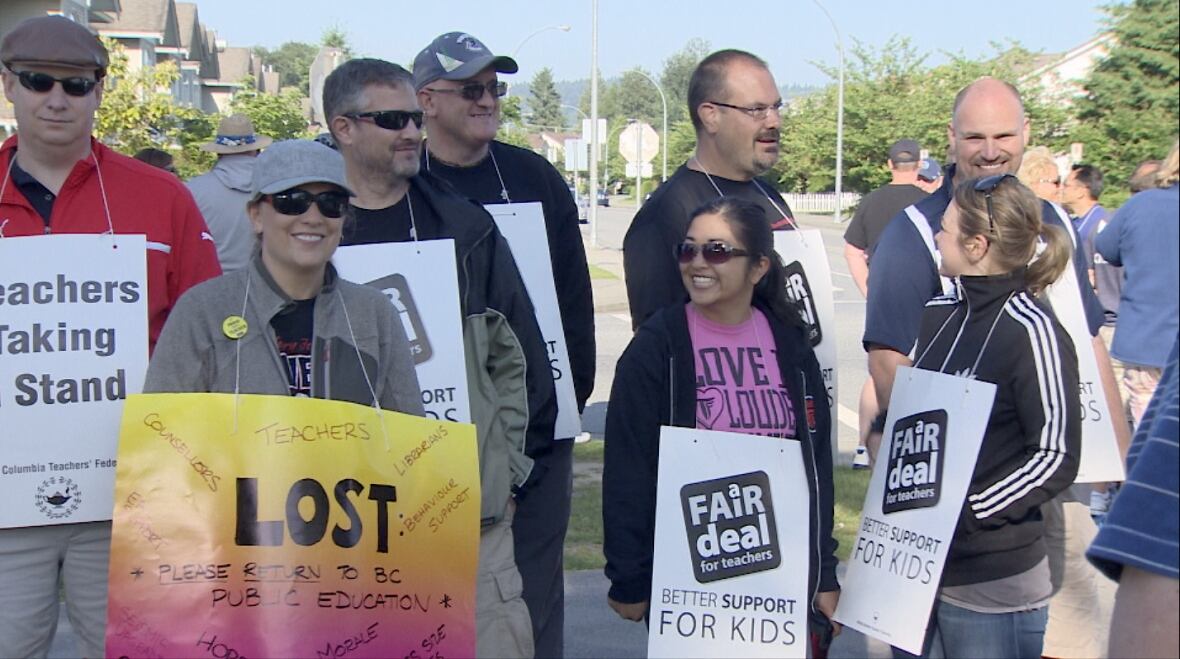B.C. teachers' strike: Make or break time with last ditch negotiations
Full-scale walkout looms, unless the union and government reach a settlement over weekend
The stage is set for teacher job action beginning Monday with a provincewide study session followed by a full-scale strike starting Tuesday.
- REACTION: Education minister 'committed' to averting strike
- VOTE: B.C. teachers to begin full-scale strike Tuesday
- MORE ANALYSIS: Same rhetoric but different rules in this B.C. teachers' strike
Despite public optimism expressed by both sides, behind the scenes neither sees a realistic way to avoid at least a couple of more days of job action keeping children out of classrooms.
But there is the potential for an 11th hour deal before the end of the school year in which teachers would get at least some of what they are asking for.

This would include a $1,200 signing bonus, allowing government to save face and not stray too far from the pattern accepted by other public sector unions.
It will all come down to marathon bargaining expected this weekend.
Either the two sides will get close and expedite an agreement, or talks will break down and push the dispute into September and the next school year.
Face-to-face talks key
For the past few days, the B.C. Teachers' Federation and B.C. Public School Employers' Association haven’t been bargaining face to face.
Instead, they’ve been going through a facilitator, but that will change Friday as the two sides actually sit down across from each other and the union tables its revised contract proposal.

If that revised proposal makes a substantial move on the wage and benefit front toward the zone of what other public sector unions agreed to, then there is a real possibility government will also move and further sweeten its current offer.
But perhaps more importantly for individual teachers, it would likely also prompt government to move on issues around class size and composition — something it has refused to do up until this point.
In other words, this could be the first real bargaining to take place in more than a year with an actual shot at finding a compromise solution.
Court battles galvanize teachers
But there are still major sticking points.
One is the province's appeal of the B.C. Supreme Court ruling that government violated teachers’ constitutional rights in removing their ability to negotiate class size and composition.
That is a decade-long fight that has galvanized many teachers to seek substantial redress and change from government.
Given the court findings in their favour, they won’t easily be convinced to take less.
From the government’s perspective, although the court has twice ruled against it, the province still hopes for a successful appeal of the latest judgment and likely doesn’t want to put more money on the table than it absolutely has to.
One-size-fits-all approach
There’s also the comparison with other public sector unions.
Although the union doesn’t like the one-size-fits-all approach that Premier Christy Clark's Liberals are applying to public sector bargaining, the Liberals don’t appear to have a way of getting out of it.

They have now settled with more than half of public sector workers with raises of roughly 5.5 per cent over five years.
If government strays too far from that formula with teachers, it runs the risk of triggering "me too" clauses with other unions.
So major challenges remain, but with a looming full-scale strike upping the pressure, this weekend does have the potential for some significant movement.
What remains to be seen is whether that movement is toward a deal or toward even more job action — and uncertainty for the entire education system.


